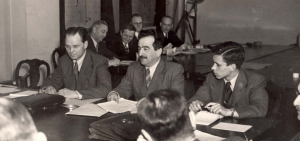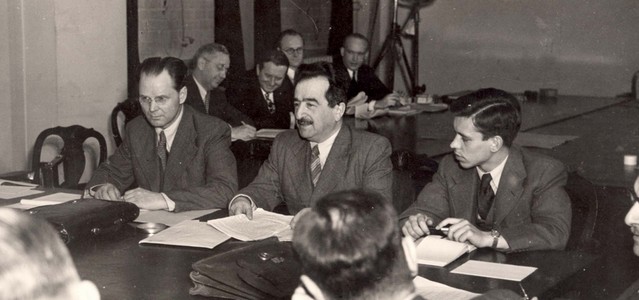
Aron Trainin (1889-1957) was a Soviet legal scholar most known for his work on the Soviet doctrine of complicity and its application to international crimes, as well as his contribution to the definition of the crime of aggression. Trainin also published studies on international terrorism, crimes against humanity, and genocide. Born in Vitebsk, now Belarus, in a Jewish family, he entered the Moscow University's law faculty in 1903 and embraced revolutionary ideas quite early. He was even arrested twice for participation in student demonstrations. Upon graduation from the university, the promising lawyer was offered a position at the Department of Criminal Law in his alma mater. In 1912, Trainin, together with many leading professors, left the Moscow University in protest against the policies of the Minister of Education and started working at the People's University of Shanyavsky as an assistant professor. After publishing his dissertation “Insolvency and bankruptcy” in 1920 and several other papers on criminal law and criminal procedure, Trainin returned to the Moscow University and became one of the first Soviet professors.
From mid 1930s until the late 1950s, Trainin focused his research on different aspects of international criminal law. In 1935 he published “Criminal Intervention” (“Ugolovnaya interventsiya”), his first study in the field of international law that marked the beginning of Trainin’s work on the concept of international crimes and modes of liability for committing an international offence. In his monograph, Trainin draws from the writings of his foreign colleagues such as Professor Nikolaos Politis of Greece and Professor Vespasien Pella from Romania. Additionally, he was inspired by the idea of Polish Professor Emil Rappoport that the incitement of aggression should be punishable under criminal law, a thought that Trainin would share till the end of his academic career.
In 1937, Trainin published his new work “The defense of peace and criminal law” (“Zashchita mira i ugolovnyy zakon”), dedicated to the defense of peace against fascism by means of criminal justice. The following year he joined the Academy of Sciences of the USSR where he worked until his death on 7 February 1957. Trainin also served as the head of the department of criminal law of the Moscow University from 1942 to 1954. In addition, he was one of the founders and the vice president of the International Association of Democratic Lawyers (1947-1948) and a member of the editorial board of one of the most prominent Soviet legal journals “Soviet State and Law” (1950-1951). In the early 1950s, Trainin became a target of ideological attacks alongside other Jewish intellectuals in the USSR as part of the campaign against “cosmopolitans” and was forced to resign from his position as the head of the department. He continued to work at the university as a professor of criminal law until his death in 1957.
Aron Trainin represented the Soviet Union at the London conference of 1945 and was one of the drafters of the Nuremberg Charter. Later, he became an advisor to the Soviet prosecution team at the Nuremberg Trial. His formulation of “crimes against peace” was incorporated into the Charter of the IMT. It played an important role in the establishment of the principle of the criminality of aggressive wars thus influencing the development of contemporary international law. For him, peace was of the greatest social value and therefore a crime against peace was the most serious of all international crimes. According to Trainin, crimes against peace included acts of aggression, propaganda of aggression, agreements with aggressive goals, violation peace promoting treaties, provocations aimed at disrupting peaceful relations between countries, terrorism, and support of armed groups and fifth columns.
Trainin’s works on complicity also influenced the adoption by the Allies of the legal concept of “conspiracy” against peace, traditionally thought to be an invention of Western lawyers. The Soviet concept of complicity was introduced by infamous Andrey Vyshinsky, the Procurator General of the USSR at the time, and successfully used at Moscow purge trials (1936-1938). To prove the guilt of a defendant and his complicity in the commission of a crime, it was mostly enough to prove his membership in an anti-Soviet conspiracy. According to Trainin, there were three levels of complicity. The most important one, in terms of its later influence on international law, was special complicity sui generis, referring to participation in a criminal association, members of which might not know one another but are united in pursuing the same goal.
Trainin and Vyshinsky closely cooperated in their intellectual efforts, but it was Vyshinsky who defined and led this cooperation. Vyshkinsky had deep interest in Trainin’s scholarship; he edited his books and even suggested possible topics. Such involvement of Vyshinsky in Trainin’s work indicates that the latter not only expressed his personal opinion but also the official position of the Soviet state. Vyshinsky and Stalin trusted Trainin so much that they relied on him to represent Soviet interests at the highest level.
Valentyna Polunina (George Mason University, US)
Bibliography
-
Aron Trainin (ed. and foreword by Andrey Vyshinsky), Ugolovnaya interventsiya. Dvizheniye po unifikatsii ugolovnogo zakonodatel'stva kapitalisticheskikh stran (Moscow: Sovetskoye zakonodatel'stvo, 1935).
-
Aron Trainin, (ed. and foreword by Andrey Vyshinsky) Zashchita mira i ugolovnyy zakon (Moscow: Yuridicheskoye izdatel'stvo NKU SSSR, 1937).
-
Aron Trainin, Ucheniye o souchastii (Moscow: Yuridicheskoye izdatel'stvo NKU SSSR, 1941).
-
Aron Trainin (ed. Andrey Vyshinsky), Ugolovnaya otvetstvennost' gitlerovtsev (Moscow: Yuridicheskoye izdatel'stvo NKU SSSR, 1944).
-
Aron Trainin, Bor'ba s genotsidom kak mezhdunarodnym prestupleniyem. In: Sovetskoye gosudarstvo i parvo, vol. 5, 1948.
-
Aron Trainin Zashchita mira i bor'ba s prestupleniyami protiv chelovechestva (Moscow: Izdatel'stvo AN SSSR, 1956).
-
N. F. Kuznetsova ed., Trainin, Izbrannie proizvedenia (St. Petersburg: Yuridichesky Center Press, 2004).


